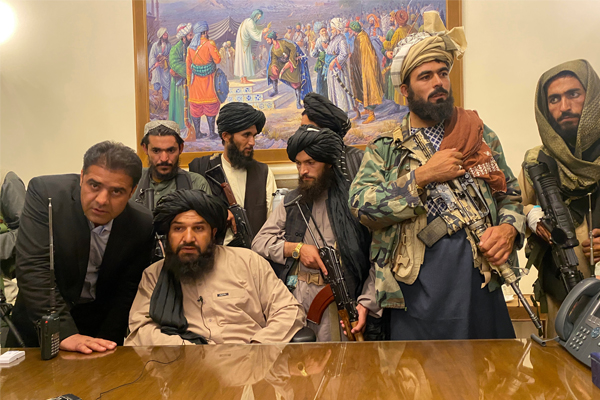As the Afghan government fell to the Taliban due to the withdrawal of U.S. forces, South Korean conservatives highlighted the importance of joint U.S.-ROK military exercises, which President Moon Jae-in and other leftists have fought against.
Choe Jae-hyeong, former head of the Board of Audit and Inspection under the Moon administration and one of the key presidential candidates from the main opposition People Power Party (PPP), wrote on his Facebook on Monday that the South Korean government should promote the awareness of national security. “The Afghanistan government technically collapsed today,” he said. “The U.S.-ROK alliance is not comparable with the U.S.-Afghanistan alliance, but we need to think seriously about national security after watching Kabul’s miserable fall.”
“On paper, there were around 300,000 Afghanistan government forces but they knelt too easily to the Taliban, which is a lot smaller in size,” he said. “The United States spent a tremendous amount for 21 years but failed in the country and left. There is only one lesson from this, which is if we do not have the will and resolve to protect ourselves, there is no meaning in receiving help from outside.”
Choe added that, “North Korean nuclear weapons are the biggest threat to our national security and Kim Jong-un ordered the development of tactical nuclear weapons earlier this year.”
“However, the Moon Jae-in administration looks the other way on this issue and tries to make the joint military exercises with the United States, which are conducted to protect ourselves, the major hurdle in inter-Korean relations. I am seriously concerned about [this administration’s] national security view that unconditional engagement [with the North] can bring peace.”
Yoo Seung-min, a former lawmaker and presidential hopeful from the PPP, pointed out that the Taliban quickly declared victory after occupying Kabul and the president of Afghanistan fleeing the country. “This happened just a few months after the United States announced that its forces will withdraw from Afghanistan for their national interests after being stationed there for nearly 20 years,” he said. “This case clearly shows the destiny of a country that has no will or capability to protect themselves.”
“President Moon Jae-in praised the success in achieving self-reliant national defense yesterday, but he did not mention who is threatening the Republic of Korea’s national interests,” he said. “In order to protect the country, the leader should clearly and correctly identify the threat and have clear views on who is the main enemy of the country. How can we protect our country if the commander-in-chief does not mention the North Korean nuclear threat? The Afghan government forces did not surrender to the Taliban just because they had a lack of weapons.”
President Moon Jae-in gave a speech at an event celebrating National Liberation Day on August 15. He said, “self-reliant national defense has been our desperate dream for the past century.”
“Upholding the spirit of the independence armies and the Korean Liberation Army, our Army has grown into a cutting-edge, formidable military force… we are building defense capabilities that no one dares to challenge.”
During his speech, Moon did not talk about North Korea’s nuclear threats but only laid out optimistic views that is not in accord with the current inter-Korean situation. Pyongyang has released threatening statements almost every day for the past week regarding the U.S.-ROK joint military exercises.
“Division is the biggest obstacle blocking our growth and prosperity and simultaneously a tenacious barrier to permanent peace,” he said. “Like Germany, we can also remove this barrier. Although unification may take some more time, we can create a Korean Peninsula model in which the two Koreas coexist and contribute to the prosperity of Northeast Asia as a whole through denuclearization and permanent peace on the Peninsula.” This was the only part of his speech in which he used the word “nuclear.”
Yoo also criticized Moon for a lack of historical understanding. “President Moon described it as the two Germanies being united upon agreement, but the historical fact is different,” he said. “East Germany resisted the wave of reform and opening up and persisted with its communist dictatorship, which led to the large-scale exodus of its citizens and the eventual absorption by West Germany.”
“What threatens our survival, prosperity, and permanent peace are the North Korean nuclear weapons and the North Korean government that violates human rights. There can be neither real peace nor unification if you disregard truth and distort facts.”
The news media around the world are often comparing the situation in Afghanistan with the fall of Saigon, South Vietnam, in 1975. In South Korea, conservative commentators have brought up President Moon’s previous comment that he was euphoric when he heard the Americans lost in Vietnam, and asked whether he sees Kabul’s fall in the same way.
The latest opinion poll from Next Research showed on August 16 that Gyeonggi Governor Lee Jae-myung was leading all rival presidential hopefuls from the conservative PPP in hypothetical two-way races. The poll showed that support for Lee was at 36.9 percent, while the figure for former Prosecutor-General Yoon Seok-youl was 35.4 percent.
Lee is often dubbed the South Korean Bernie Sanders for his various radical ideas, including adoption of the universal basic income program. He recently announced that he will send out stimulus checks to the residents of his province, which brought criticism from both his Democratic Party (DP) and the PPP for trying to buy presidential support through his gubernatorial position.
Last month, Lee said, “we were not able to resolve the pro-Japanese issues and those pro-Japanese people collaborated with the U.S. occupation forces and kept their governance system.” He also argued that the country was not established in a “clean way.”
When asked about such comments from key leftist politicians in South Korea, Rep. Andrew Biggs (R-AZ) told One Korea Network that if the United States were to say they will remove troops from South Korea, put some in Japan and bring the rest back home, “then that kind of rhetoric will stop almost immediately.”


